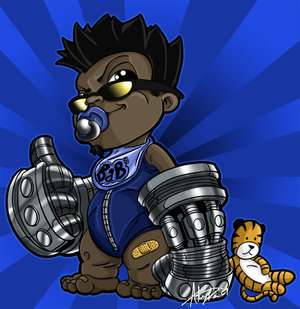Let me just say that if you have any interest whatsoever in making your own arcade stick controller, pay Slagcoin's page a visit. It is a wealth of information about every aspect of custom controller creation. It will literally tell and show you everything you need to know about how to make a controller from start to finish. I wish I had found this page before I ordered my parts, but even without it I didn't do to bad.
Armed with a treasure trove of new information, I put together a shopping list of things I was going to need to do the wiring and headed down to the nearest Fry's.
- Soldering Iron - 15-25 Watt.
- Solder - Rosin Core (NOT acid core)
- Soldering Station
- Quick connectors
- Hot Glue Gun
- Wire - 22 to 26 gauge AWG
- Wire Stripper/Crimper
Fry's had a wide selection of Soldering Irons. I couldn't find any 15 watt irons, but I found 12 watt and 25 watt, so I opted for the 25 watt. I have no idea what this will mean for a novice, hopefully it won't be too much for me to handle. I also picked up some 0.32 diameter solder in a dispenser pack. This seemed like it would be easier for me to handle than the spools. Again, rosin core. Every website that I read up on stressed this. Acid-core solder wasn't appropriate for soldering on electronic components.
I found a pretty basic soldering station. This is a small stand with a coiled wire for holding the soldering iron and a sponge, which you wet and use to clean the tip of the iron. I also found a handy little 'helping hands' tool, which is a couple of articulated arms with alligator clips and a magnifying glass. I've been reading up on soldering and it seems it can be a bit awkward holding the wire, soldering iron, solder, and the PCB that you're soldering to. It was pretty inexpensive, so I snagged it.
Fry's had a small, battery powered hot-glue gun. Hot glue guns are always handy, and I've been meaning to pick one up, so this was just a perfect excuse. I've never used a battery powered one before, so we'll see how it works out.
I grabbed two small spools of 24 gauge, stranded, tinned copper wire. One black and one red.
After 20 minutes of scouring through their racks of quick connectors, I wasn't able to find the particular ones I needed. The switches on the joystick have 0.187" plugs while the switches on all of the buttons use 0.110" plugs. It doesn't seem like Fry's even stock 0.110 female quick disconnects (possibly a Japanese size?) and they were out of the 0.187".
I wasn't able to find a tool that could strip and crimp 24 gauge wire, so I ended up just getting simple stripper. I could have sworn I already had one of these from a few years ago when I installed our home theater system.
All together, I spent a bit under $50. Between this and the arcade parts, I'm already $90-$100 into this project. So the expensive, commercial built arcade sticks aren't looking like such a bad deal now.
After I got back home I jumped back on the internet and attempted to find the female quick disconnects I want. Having these things will mean that I don't have to solder wires directly to the switches on the buttons and joystick. It would make the whole thing a lot easier to put together. Unfortunately, these things are pretty hard to find right now. Lizard Licks sells them, but they're backed up until the end of April. I found other sources, but they only sell in bags of 100. As I only need 8 in 0.187" and 18 in 0.11", ordering 2 bags of 100 seems like a waste. I also noticed that most of these quick disconnects are made for 18-22 gauge wire, and I've got some concerns about them fitting the 24 gauge wire.
And of course I found the wire stripper/crimper that I had originally thought I had. It also only goes as small as 22 gauge wire. Since I'm going to have to return the stripper I bought, I might as well exchange the 24 gauge wire for the slightly thicker 22 gauge...just in case I can get my hands on some quick disconnects.

No comments:
Post a Comment